Mandatory Social Health Insurance (MSHI) Printable version
Last update: 22.08.2025Useful links:
Also look:
The Mandatory Social Health Insurance (MSHI) was introduced on January 1, 2020. Thanks to its implementation, funding of healthcare sector has increased by more than 2,5 times. In 2019, prior to the launch of MSHI, about KZT 1 trillion was allocated for statutory free medical assistance. In 2024, more than KZT 2.8 trillion is provided for funding medical care to the population, including KZT 1.6 trillion for statutory free medical assistance and more than KZT 1.2 trillion for MSHI. A significant increase in healthcare funding at the expense of MSHI has allowed to improve the availability of medical care.
Basic principles of the MSHI system:
- social orientation: the state pays contributions for 11 million citizens from 15 benefit-entitled categories of population;
- shared responsibility: the state, employers and citizens are responsible for the health of the population;
- equal access to medical care: every insured person has the right to the necessary amount of medical care, regardless of the amount of paid contributions;
- money goes to a patient: a patient can select a medical organization to receive medical services if it is a provider of the Fund;
- protection of patient rights: the Fund pays medical organizations for medical services only after verifying the quality and volume of medical care provided.
Statutory Free Medical Assistance
Statutory Free Medical Assistance (SFMA) at the expense of budget funds is provided to:
- citizens of the Republic of Kazakhstan,
- candas,
- refugees,
- foreigners, permanently residing on the territory of the Republic of Kazakhstan (and having a residence permit),
- stateless individuals permanently residing on the territory of the Republic of Kazakhstan (and having a residence permit).
Foreigners and stateless individuals temporarily staying in the Republic of Kazakhstan and asylum seekers have the right to receive SFMA for diseases that pose a danger to others.
SFMA is provided to citizens regardless of the status of insurance.
The Statutory Free Medical Assistance (SFMA) includes:
- Ambulance services, including the involvement of medical aviation in certain cases.
- Primary healthcare services (PHS), including:
7) sanitary/anti-epidemic and sanitary-preventive measures in the foci of infectious diseases.
- Specialized medical care in outpatient facilities:
4) diagnosis and treatment of chronic diseases subject to dynamic monitoring.
- Specialized medical care in hospital-replacing conditions:
3) treatment of chronic diseases subject to dynamic monitoring.
- Specialized medical care in hospital conditions is provided:
4) as scheduled.
- Medical rehabilitation:
2) for tuberculosis patients.
- Palliative care.
- Provision of blood-derived products upon availability of medical indications when delivering specialized medical care.
- Anatomicopathological diagnostics when providing specialized medical care in outpatient, hospital-replacing and hospital conditions.
- Sending Kazakhstani citizens for treatment abroad and (or) attracting foreign specialists for treatment in domestic medical organizations.
- Provision of medicines, medical products, specialized medical products, immunobiological medicines.

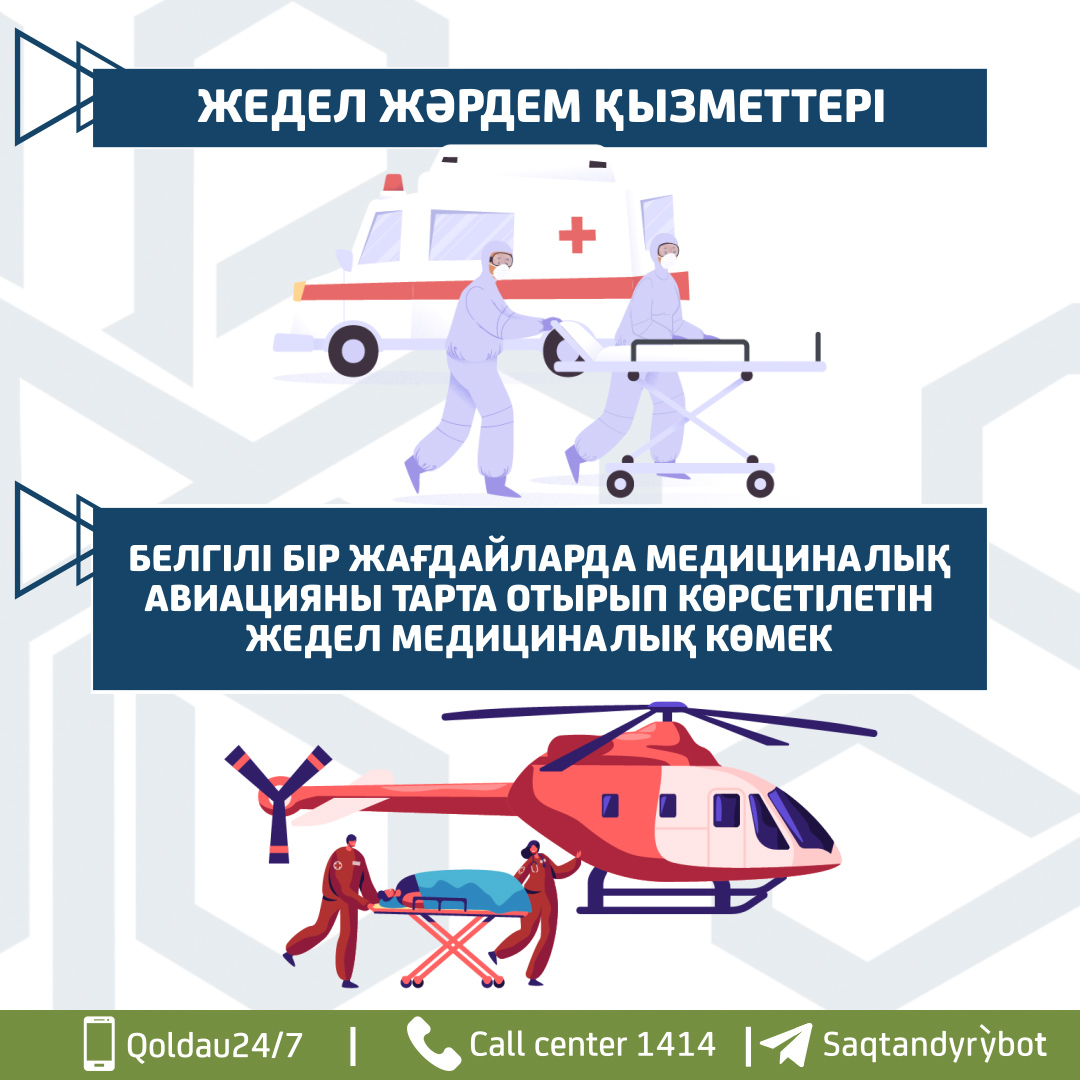
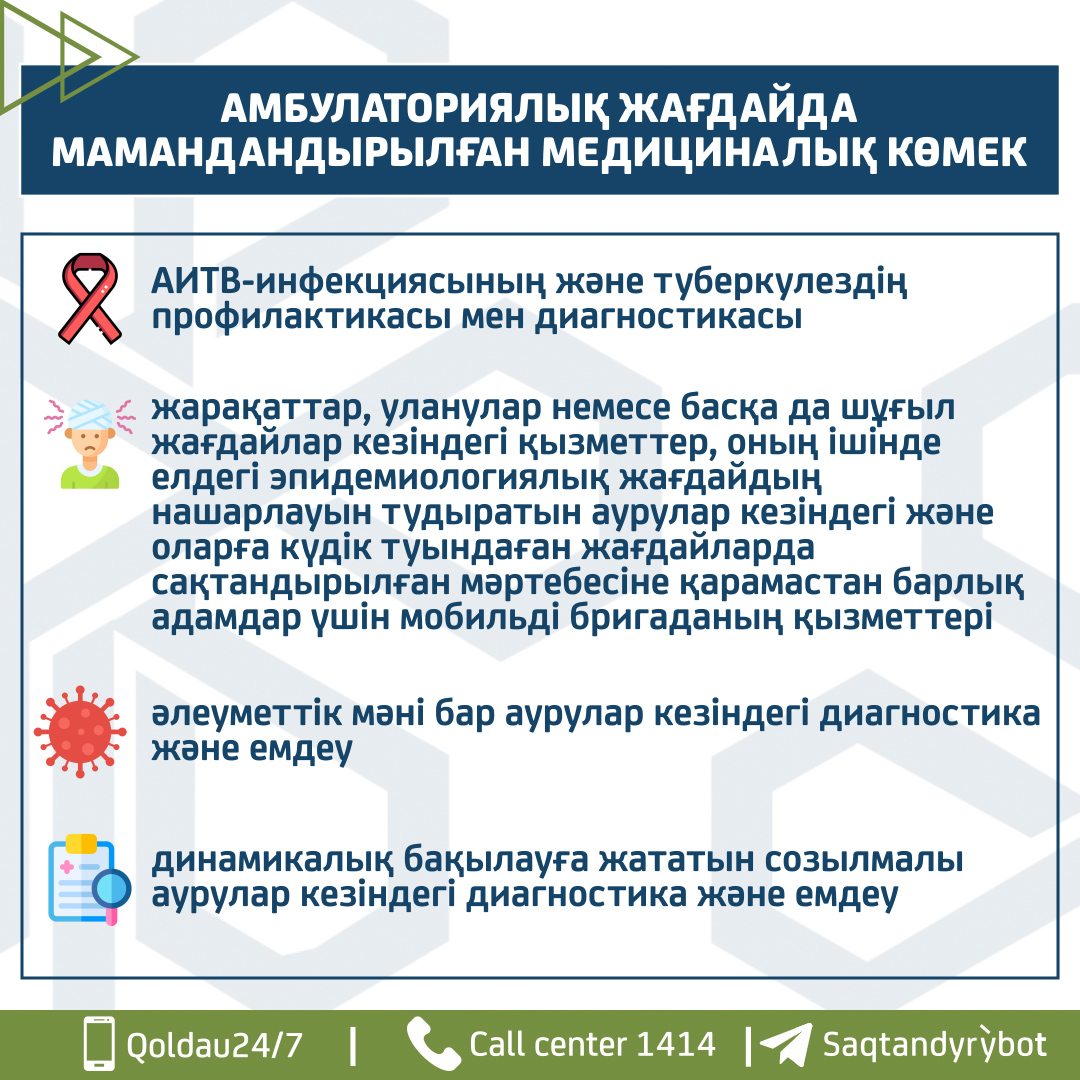
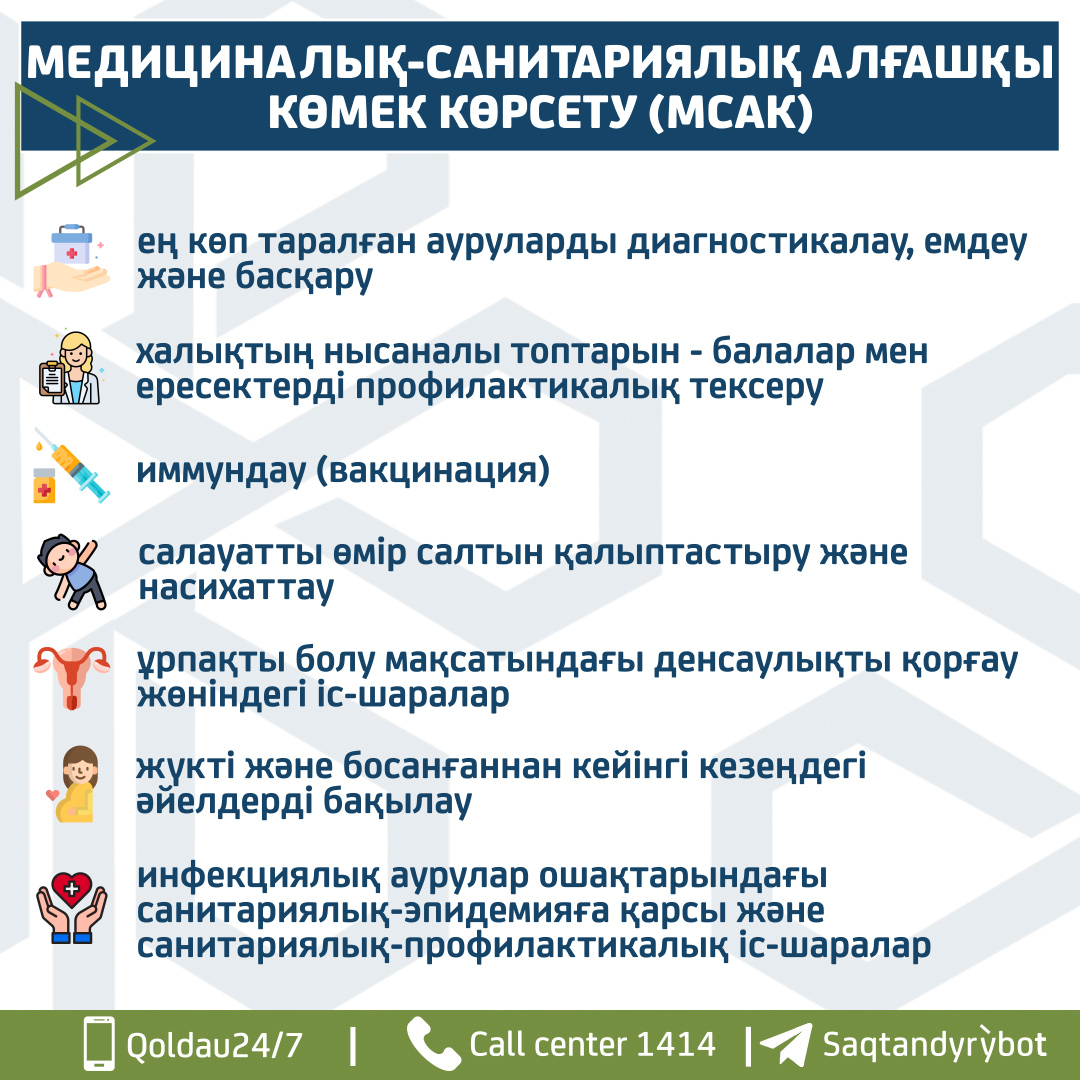
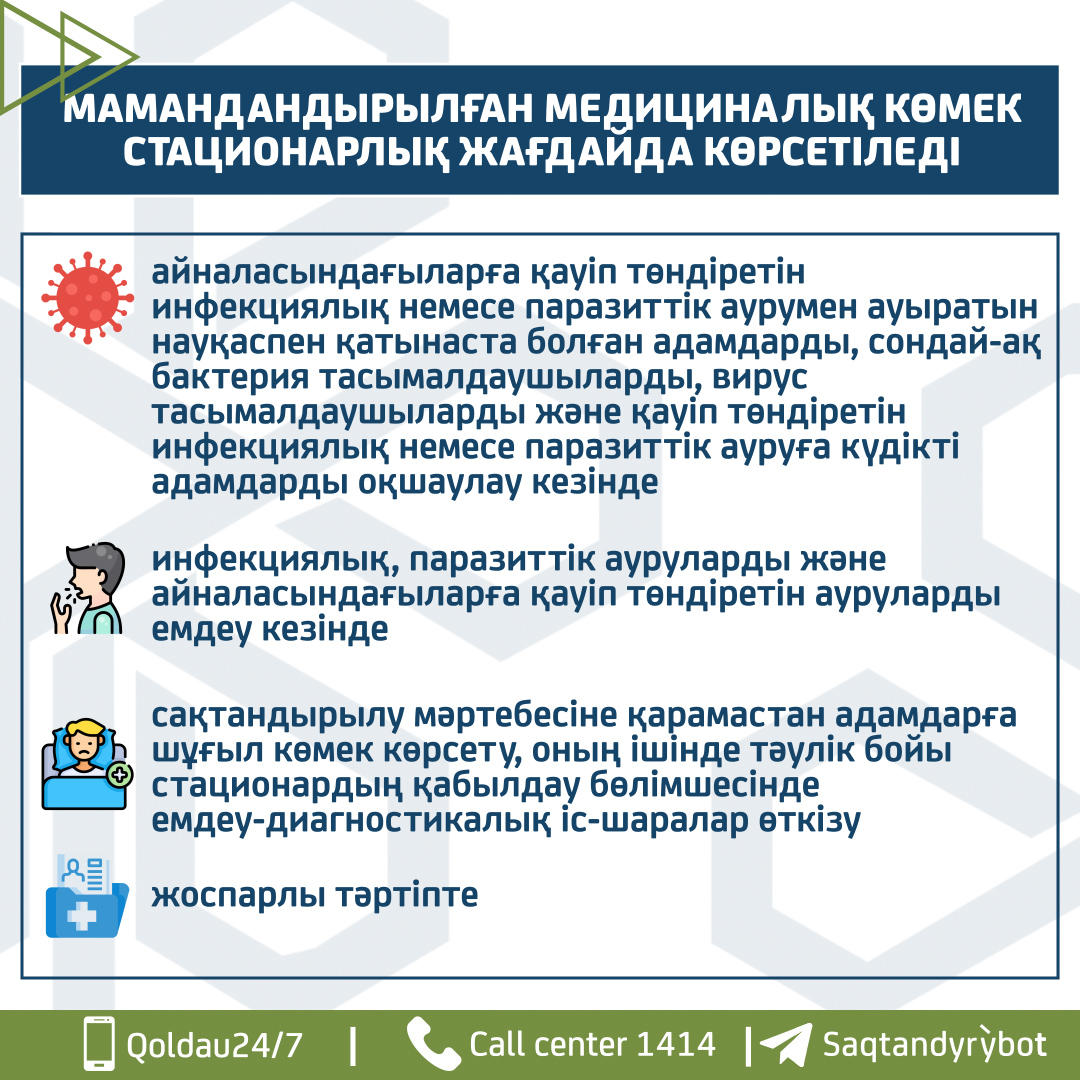
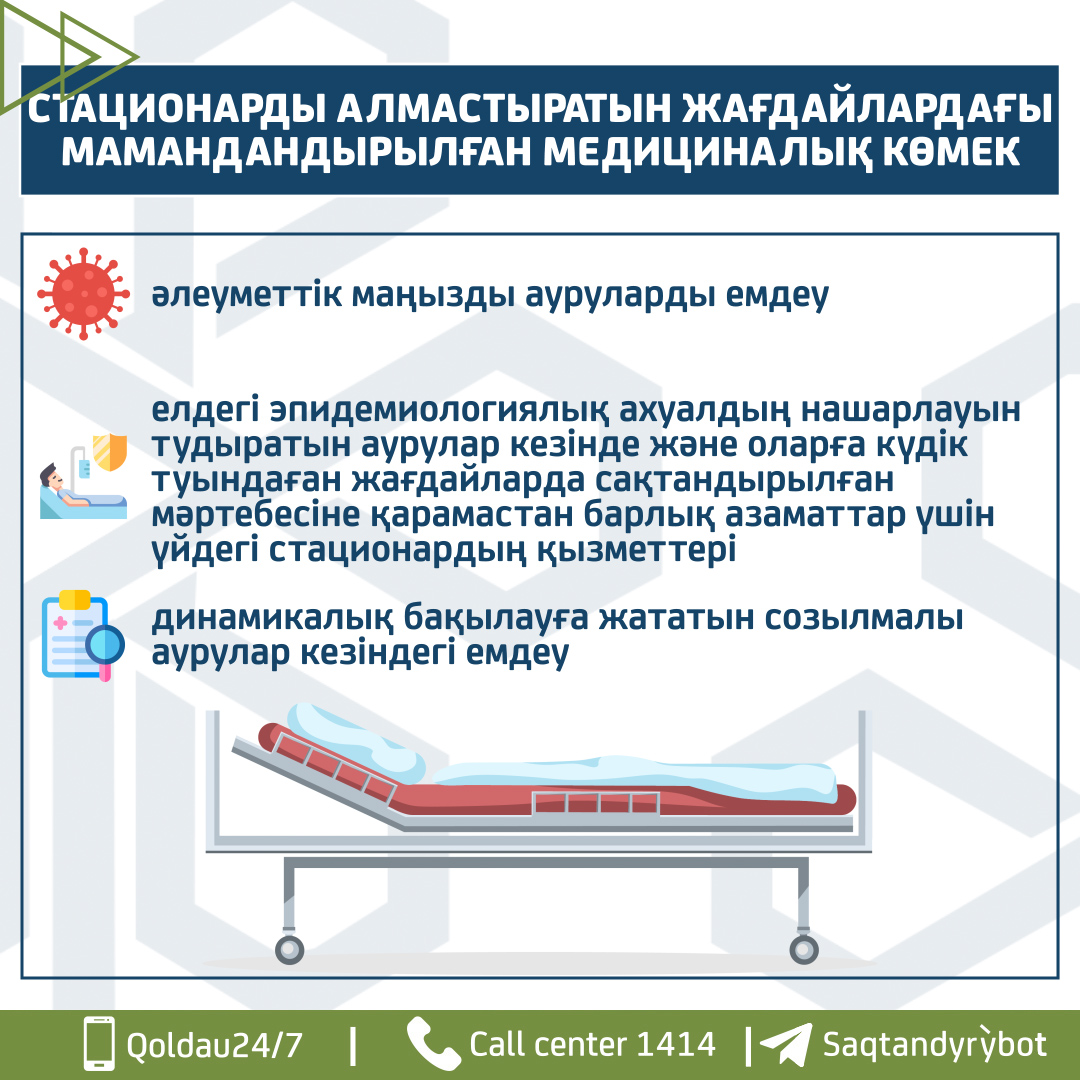
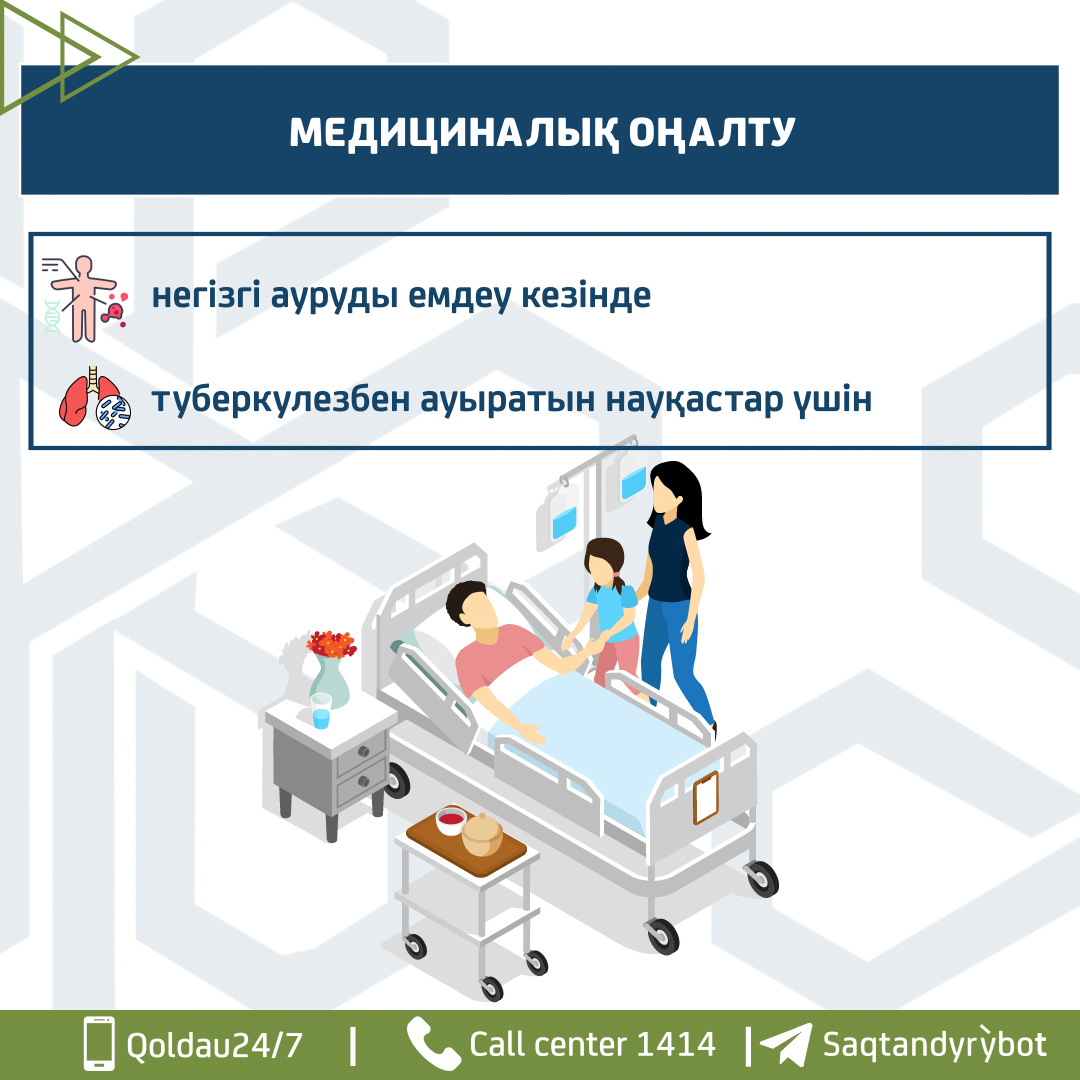
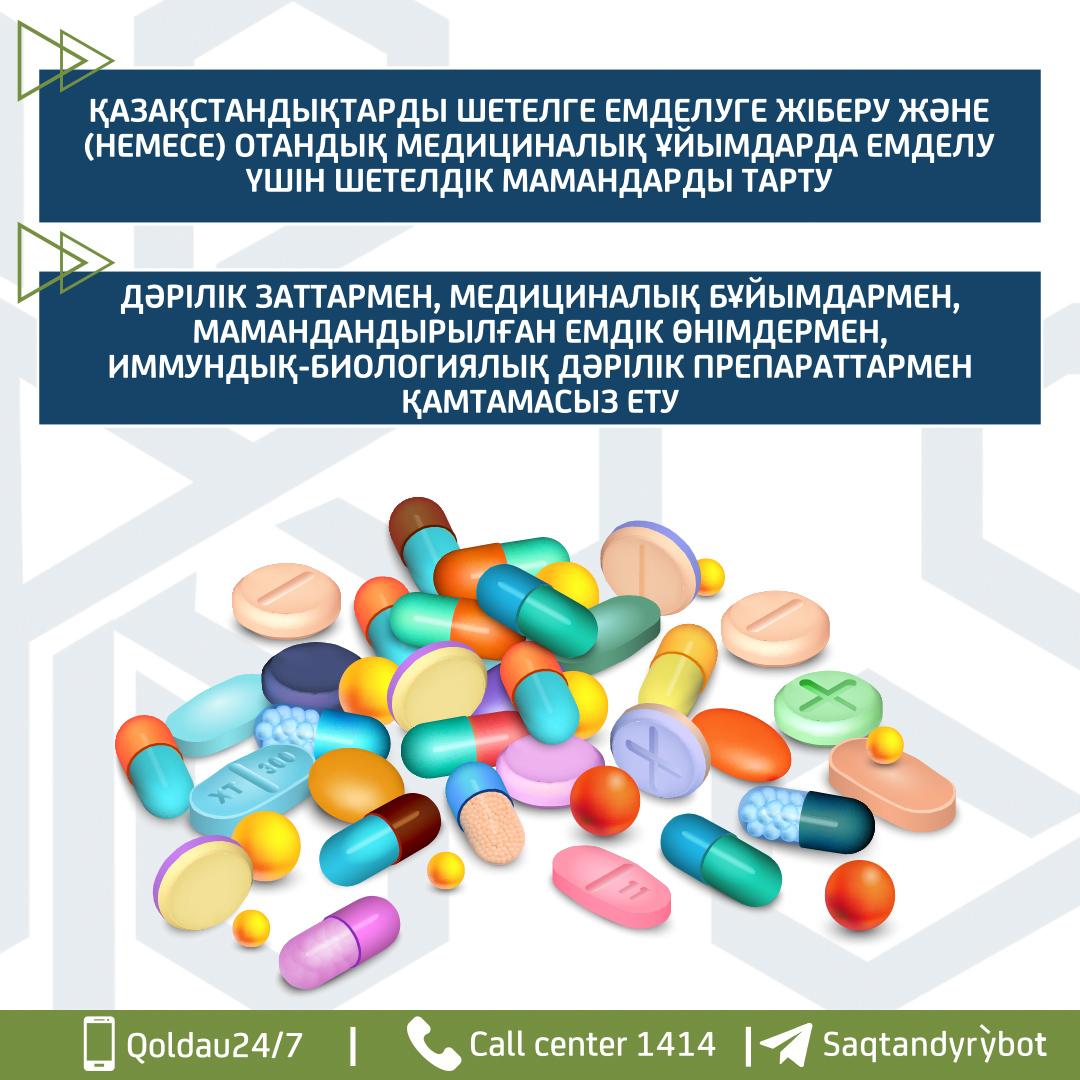
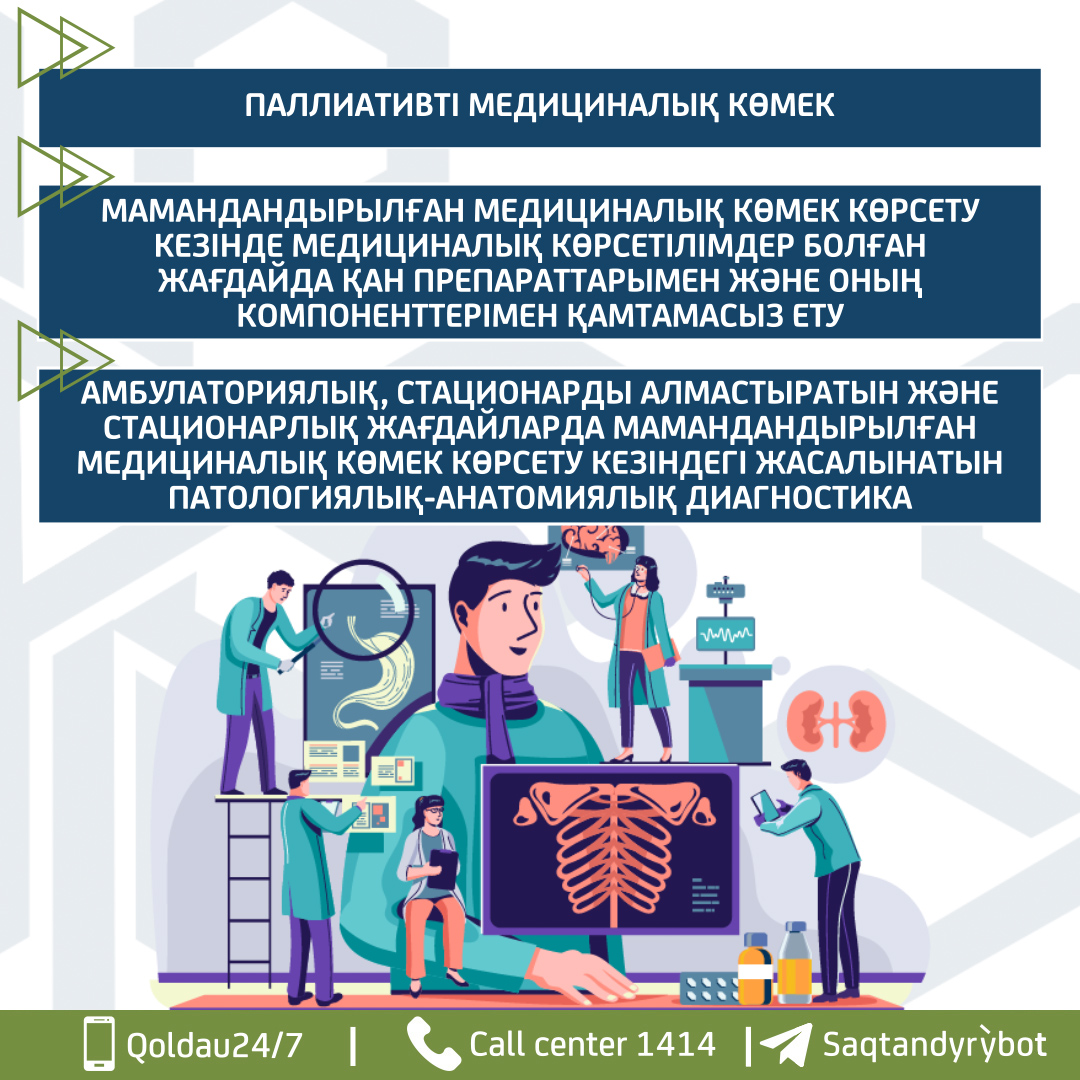
Mandatory Social Health Insurance
Citizens who regularly pay contributions to MSHI and have the "INSURED" status can receive a wider list of medical services without paying for them additionally.
The list of Mandatory Social Health Insurance includes:
- Outpatient medical care (diagnosis and treatment of diseases):
- preventive medical examinations (except for those delivered under SFMA);
- appointments and consultations of medical specialists under referral issued by a primary healthcare doctors;
- case follow-up of individuals having chronic diseases by medical specialists;
- delivery of emergency and elective dental care to certain categories of population;
- diagnostics services, including laboratory diagnostics pursuant to the list;
- other procedures and manipulations pursuant to the list;
- Specialized (high-tech) medical care in hospital-replacing conditions (except for treatment of diseases under SFMA); as well as medical services at home for diseases that cause deterioration of the epidemiological situation in the country and in cases of suspicion of them.
- Specialized (high-tech) medical care in hospital conditions in a scheduled basis (except for treatment of diseases under SFMA).
- Specialized emergency medical care in hospital conditions, including carrying out medical and diagnostic measures in the reception departments of hospitals until a diagnosis is established that does not require treatment in a hospital (except for treatment of diseases under SFMA).
- Medical rehabilitation.
- Anatomicopathological diagnostics.
- Preparation of a deceased donor.
- Provision of medicines and medical products, when delivering the following services under MSHI system:
- specialized (high-tech) medical care in hospital and hospital-replacing conditions pursuant to the medical formularies of healthcare organizations;
- primary healthcare and specialized medical care in outpatient conditions pursuant to the list of medicines and medical devices approved by the authorized body for certain categories of citizens with certain diseases (conditions).

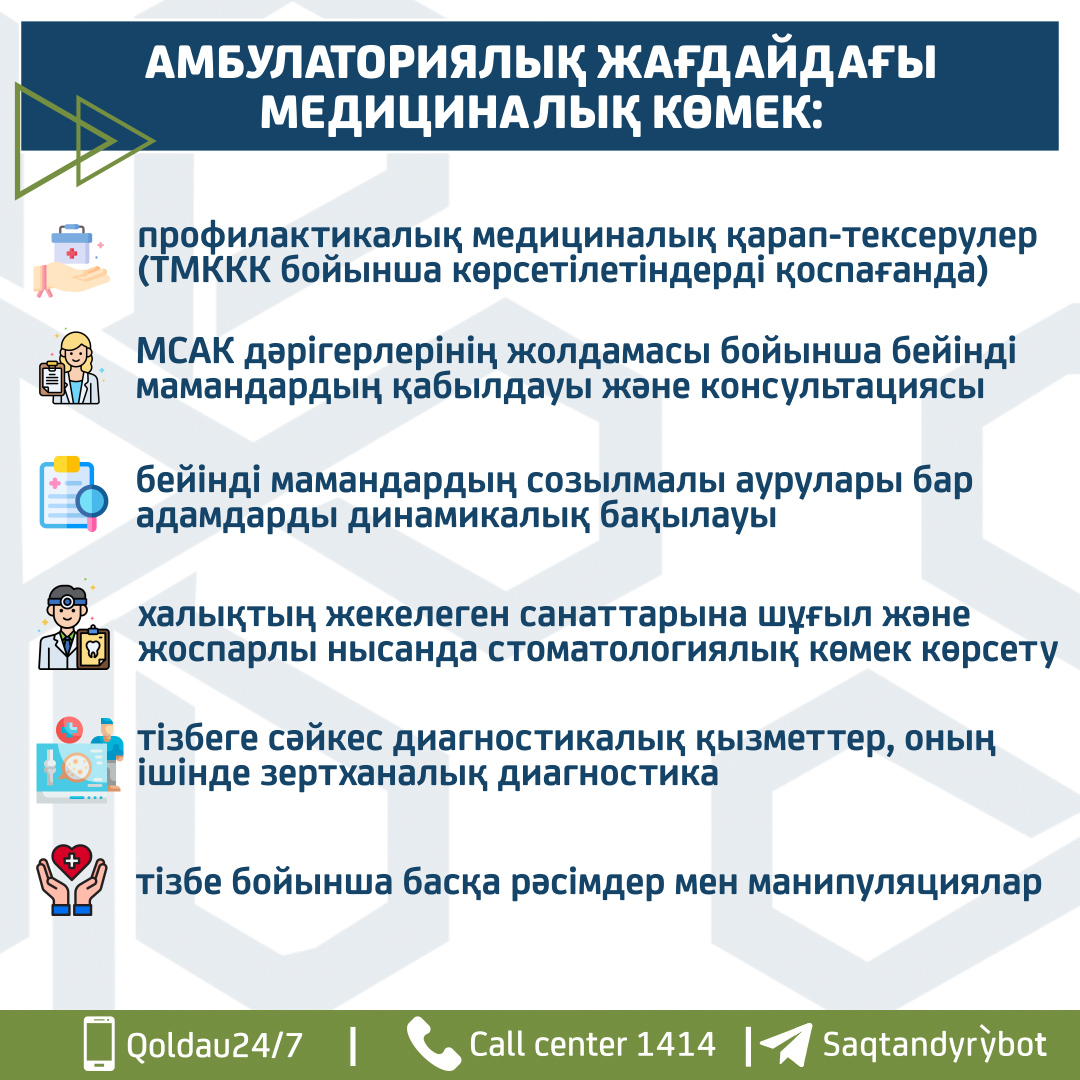
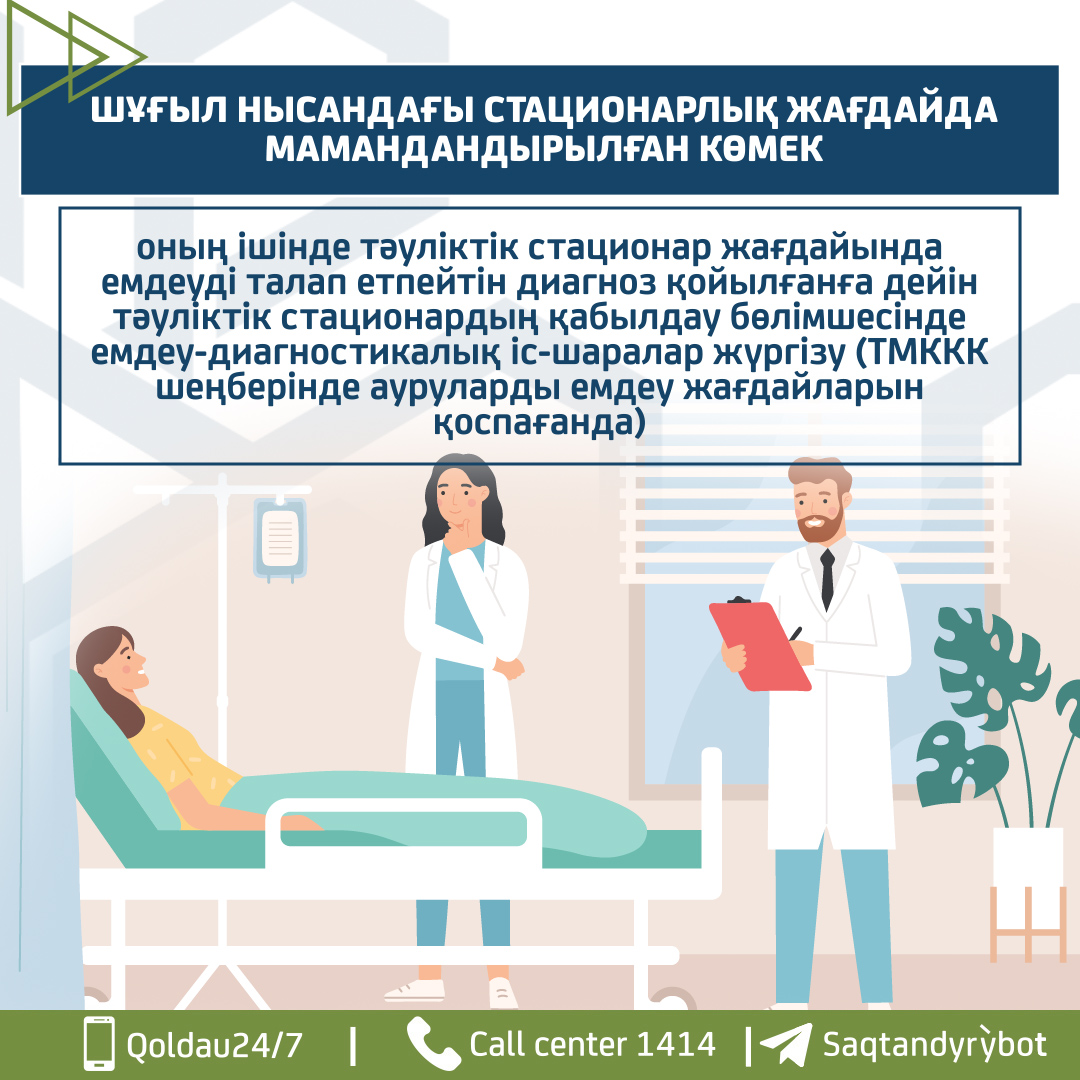
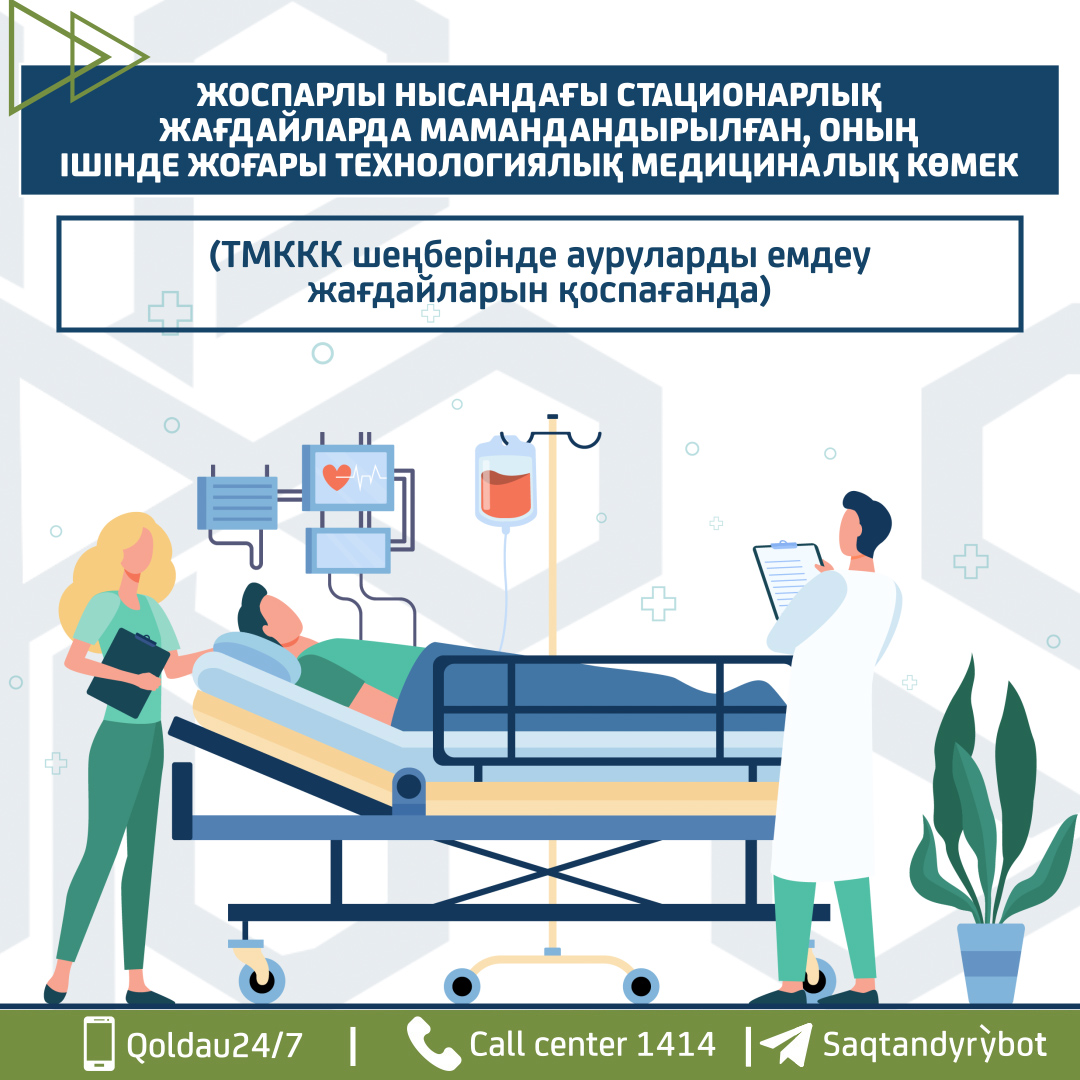

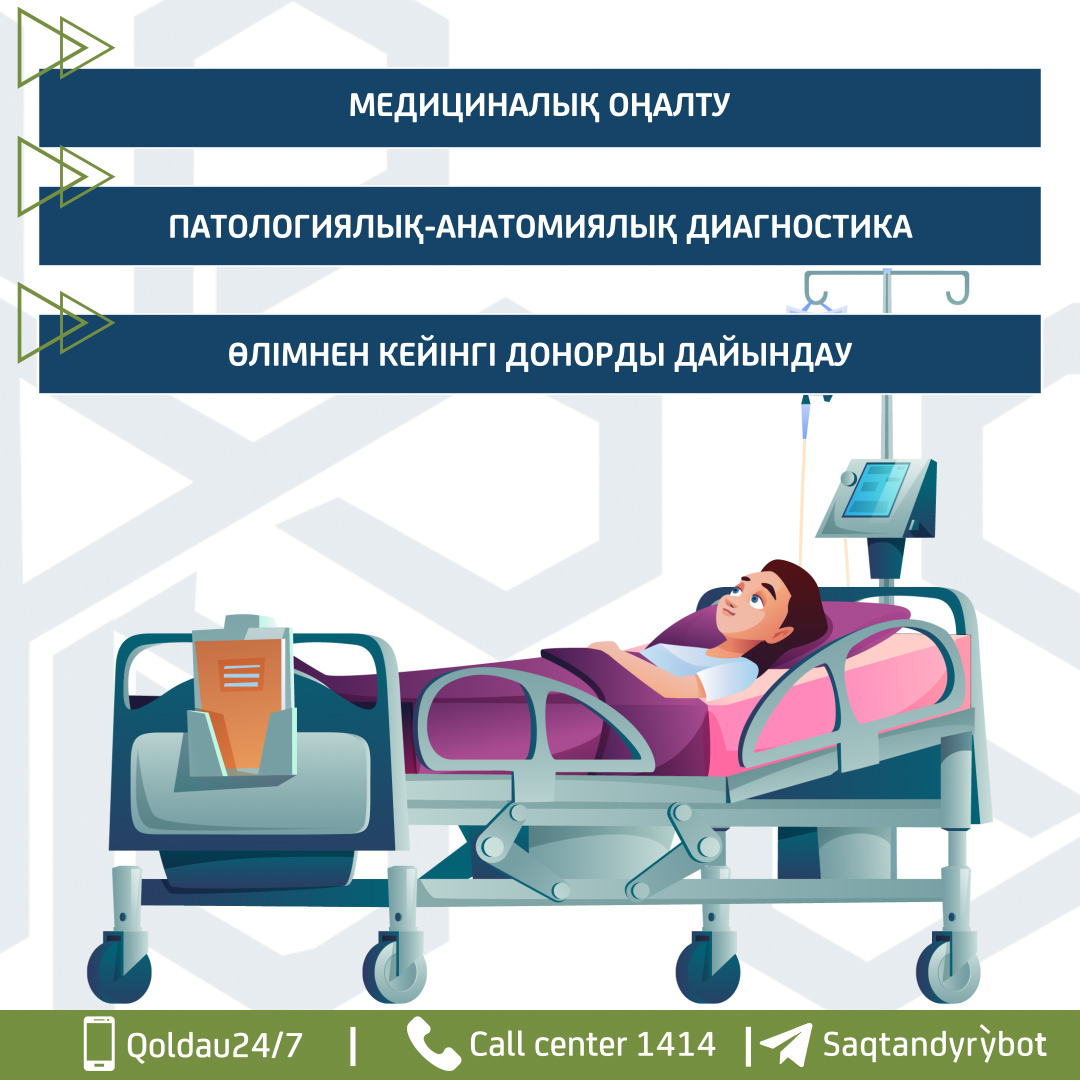
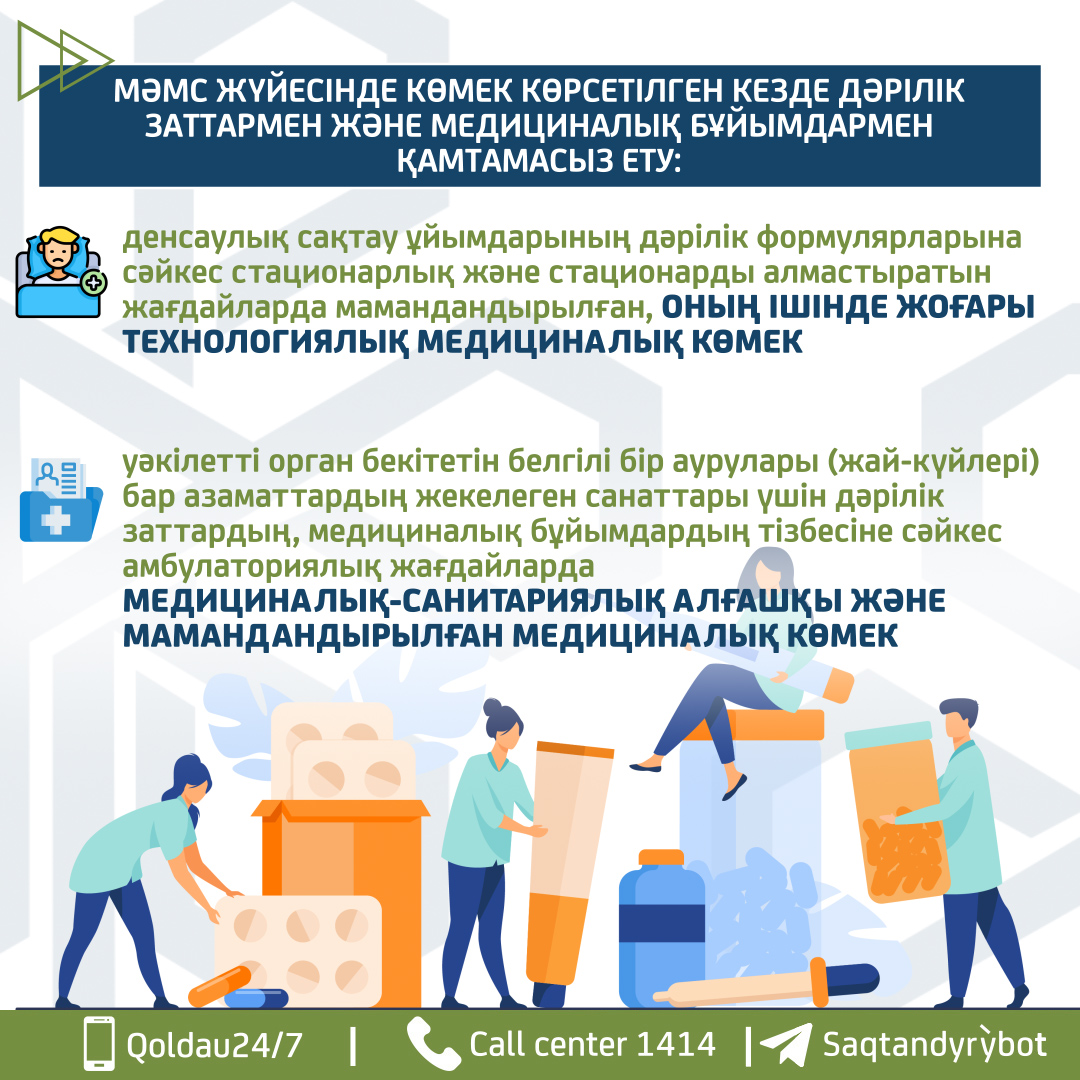
Who should i pay for MSHI to, and how much?
As of January1, 2024, the amounts of contributions and deductions for compulsory social health insurance have changed due to the increase in the minimum wage and the Monthly Calculation Index (MCI).
- *Employer: 3% out of an employee's salary, but not more than KZT 25.500, since the calculation object should not exceed 10 minimum wages. NOTE: if an employee belongs to one of the 15 benefit-entitled categories, no deductions need to be made for him/her.
- *Employees, including those receiving income under civil contracts: 2% out of income, but not more than KZT 17.000, since the calculation object should not exceed 10 minimum wages.
- Individual entrepreneurs, persons engaged in private practice and owners of farms: 5% of the 1.4 times the minimum wage, the amount in 2024 is KZT 5,950.
- Independent payers: 5% of 1 minimum wage, the amount in 2024 is KZT 4,250 per month.
- The state pays for 15 benefit-entitled categories of citizens that is more than 11 million people. The amount of contribution per person this year is over KZT 5 800.
* IS IT IMPORTANT TO KNOW how to pay for an MSHI if you work in two places? If citizens are employed in two organizations, the marginal income is taken into account when calculating payments - this is 10 minimum wages (KZT 850 000 in 2024). The contributions are calculated on the basis of the total income from all jobs, i.e. the total monthly contributions cannot exceed KZT 17,000 (2% of KZT 850,000). In order for the calculation to be correct, the employee should provide a certificate of the payments made from the first place of work to the second place of work. The monthly object accepted for calculating deductions should not exceed 10 times the minimum wage (3% = KZT 25,500).




How to get an insured status?
Following the Order of the Head of State, amendments to the Law "On Mandatory Social Health Insurance" came into force on September 5, 2022 and provide for an alternative way to participate in the MSHI system.
Previously, in order to obtain an insured status, it was necessary to have contributions for the past 12 months. In the absence of payments during the period, arrears arose. Now the status can be obtained by paying contributions for 12 subsequent months, that is, it is not necessary to repay the debt for the past year.
Thus, in order to insure for a year ahead, it is necessary to pay contributions of KZT 4.250 for each month separately. It is important to make 12 separate payments, since when making a payment of total amount KZT 51.000, the system will not assign the status under a new mechanism.
It is possible to pay contributions for MSHI through any second-tier bank, mobile applications of banks, quick payment terminals and through Kazpost branches.
The benefit-entitled categories that are insured at the expense of the state include:
- children under 18;
- unemployed pregnant women;
- unemployed individuals raising a child until the age of three;
- individuals on maternity leave/leave due to adoption of a newborn child, as well as those taking care of a child until the age of three;
- mothers of many children who have been awarded with "Altyn Alka", "Kumis Alka" pendants, or who have previously received the title of "Mother Heroine", as well as those who have been awarded the "Mother Glory" orders of the first and second degree;
- unemployed individuals caring for a child with disabilities;
- individuals caring for the persons with disabilities lifelong;
- people with disabilities;
- pensioners and WWII veterans;
- individuals studying full-time in organizations of secondary/ technical and vocational/ post-secondary/ higher education as well as postgraduate education;
- individuals registered as unemployed;
- unemployed recipients of state targeted social assistance;
- unemployed kandas;
- individuals serving sentences under a court verdict in institutions of the penal enforcement system, with the exception of institutions of minimum security;
- individuals held in pre-trial detention facilities.
If you fall into one of the above categories and you are uninsured, you will need to collect the relevant documents and submit them to an authorized government agency. After all the necessary procedures have been completed, you will be placed in the benefit-entitled category, and the state will pay contributions for you.

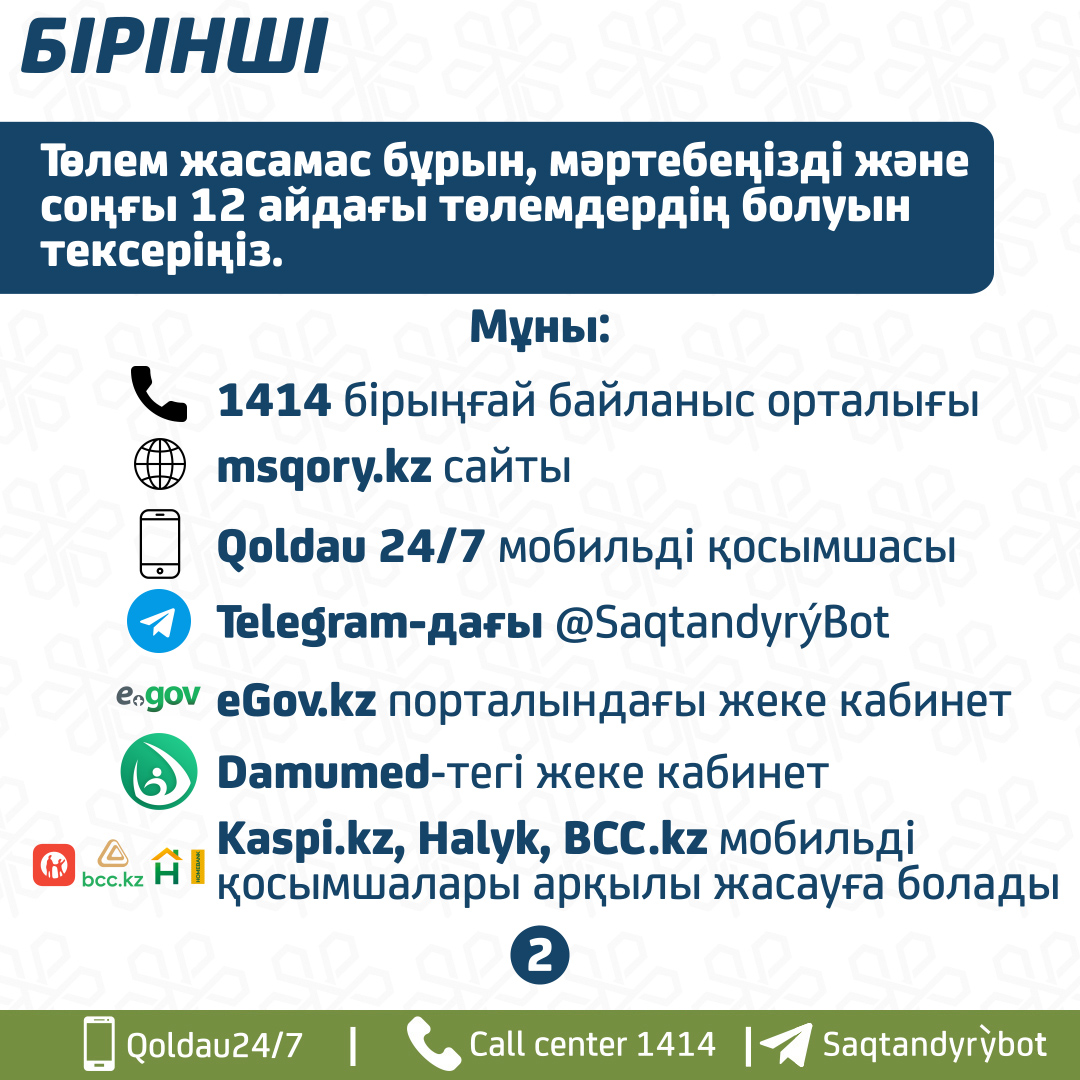
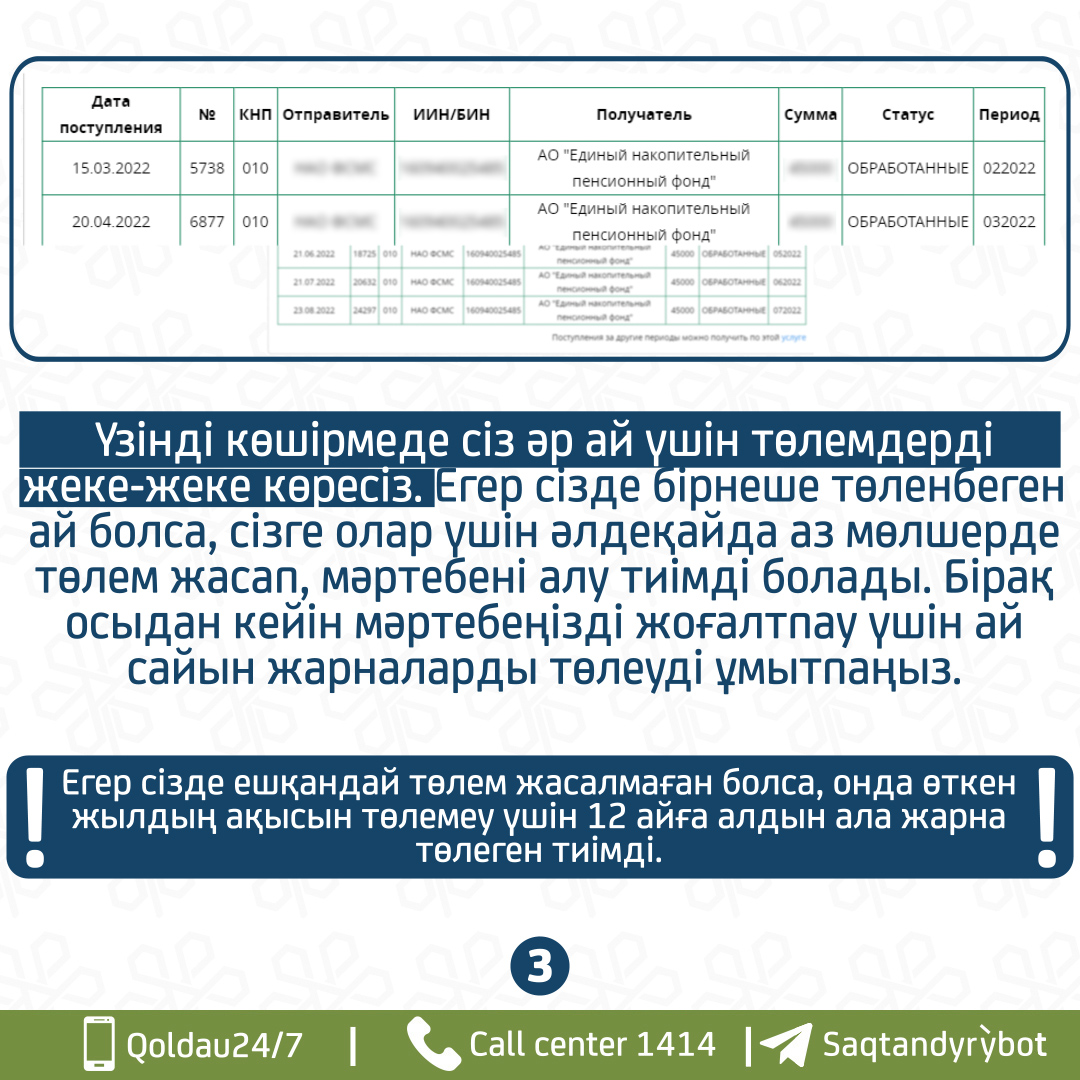
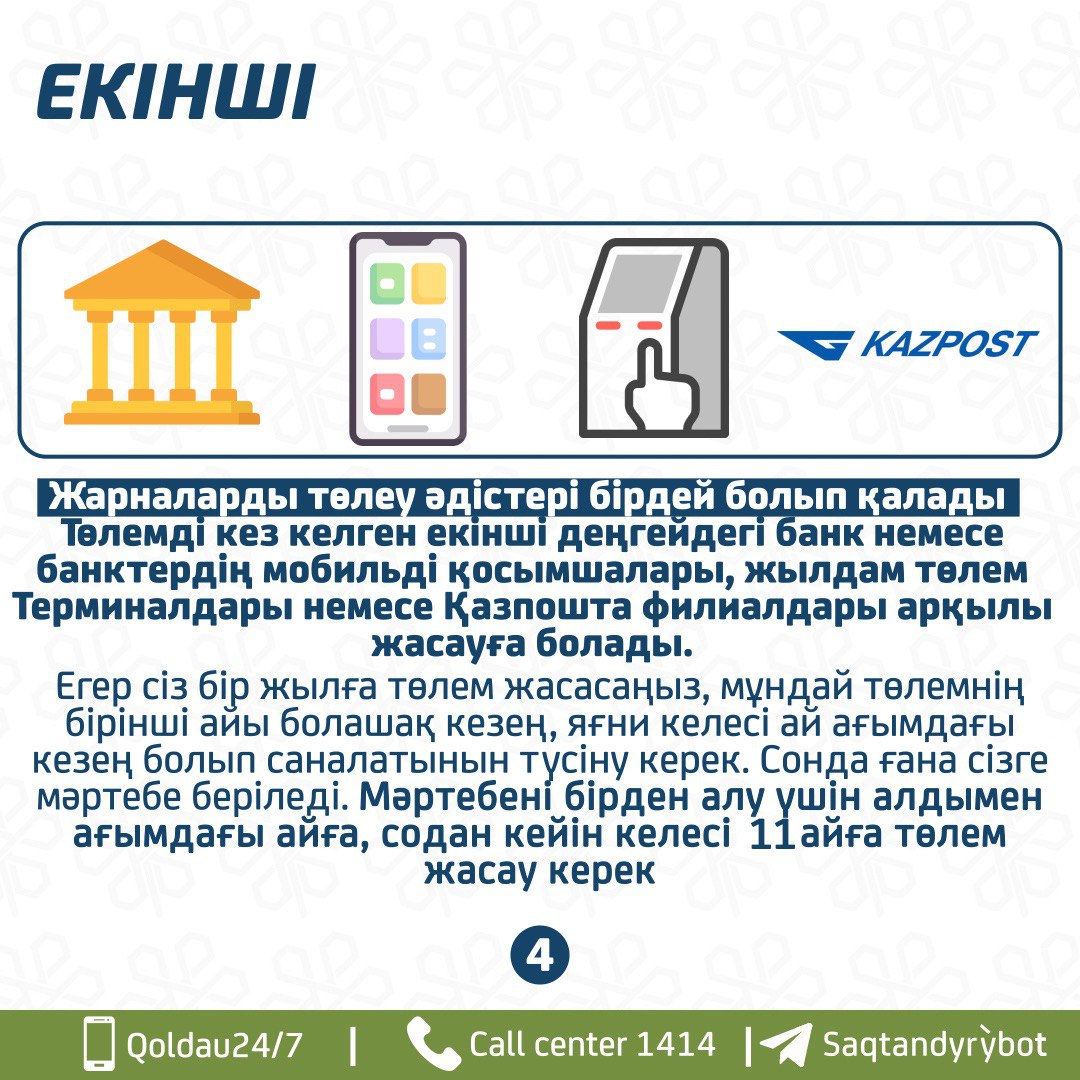
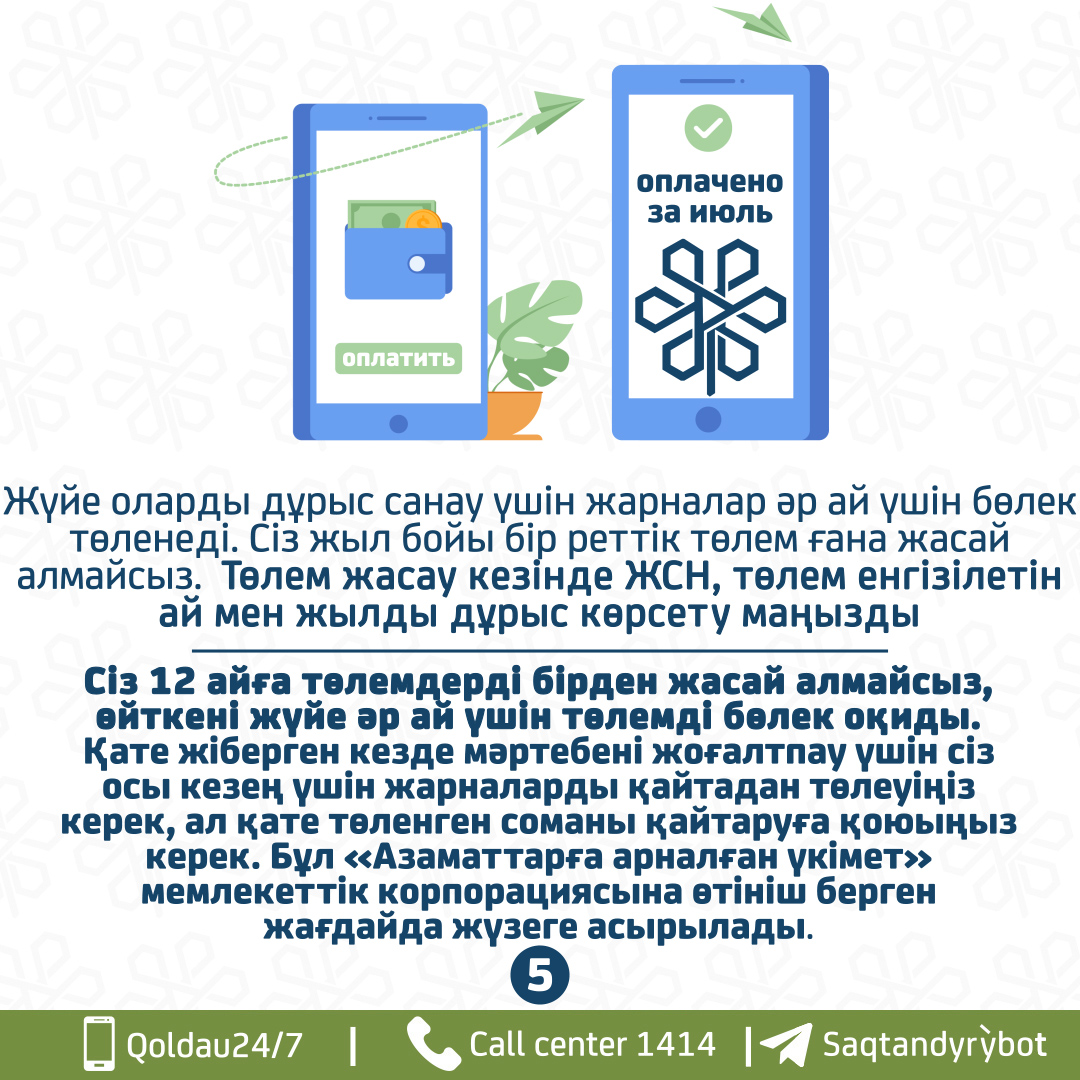
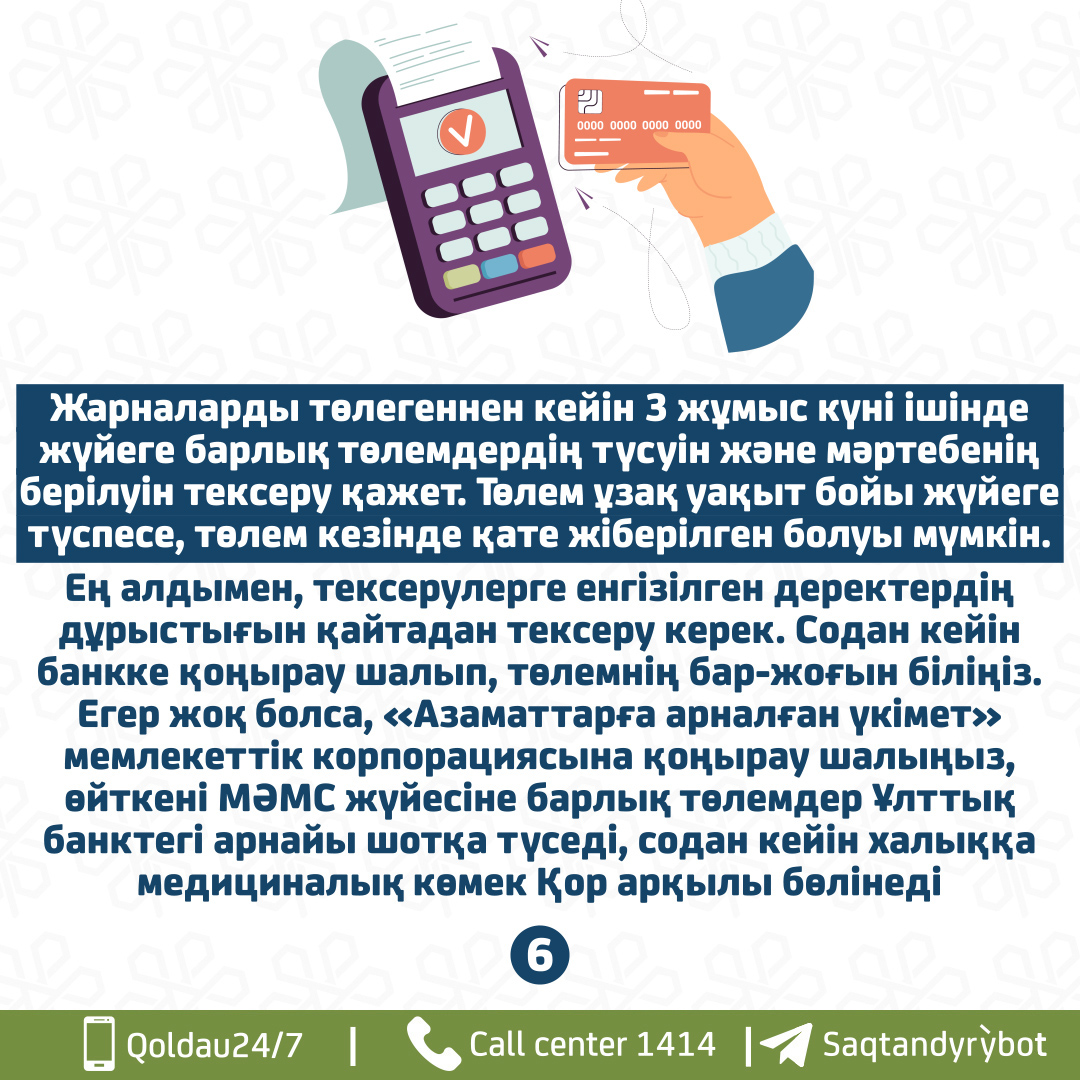
How do I check my status in the MSHI system?
There are several options to check your status in the mandatory health insurance system.
- e-Government Portal (Egov.kz).
To do this, in "Healthcare" section, you need to find the service called "Issuing information about participation in the mandatory social health insurance system as a consumer of medical services and about the amounts of deductions and (or) contributions", click "Order Service" button, fill-in your IIN. The result will appear within 10 minutes.
- The official website of the Social Health Insurance Fund: https://msqory.kz/ru
The "Check the insurance status" section is located in the middle of the page. Just enter your IIN and click "Check" button.
- Qoldau 24/7 mobile app.
Select "Check the insurance status" section in the menu, then enter your IIN. The status and information on availability of payments for the previous 12 months will appear in the window. You can download the app in PlayMarket and AppStore.
- @SaqtandyrýBot in Telegram.
To run the bot, you need to follow the link: https://t.me/SaqtandyryBot or enter its name in the search bar, then select "Check the insurance status" section, enter your IIN.
You can find out about the deductions and contributions made to your name by ordering the public service called "Issuing information about participation in the mandatory social health insurance system as a consumer of medical services and about the amounts of deductions and (or) contributions" by following the link: https://egov.kz/cms/kk/services/health_care/pass171-2_mz
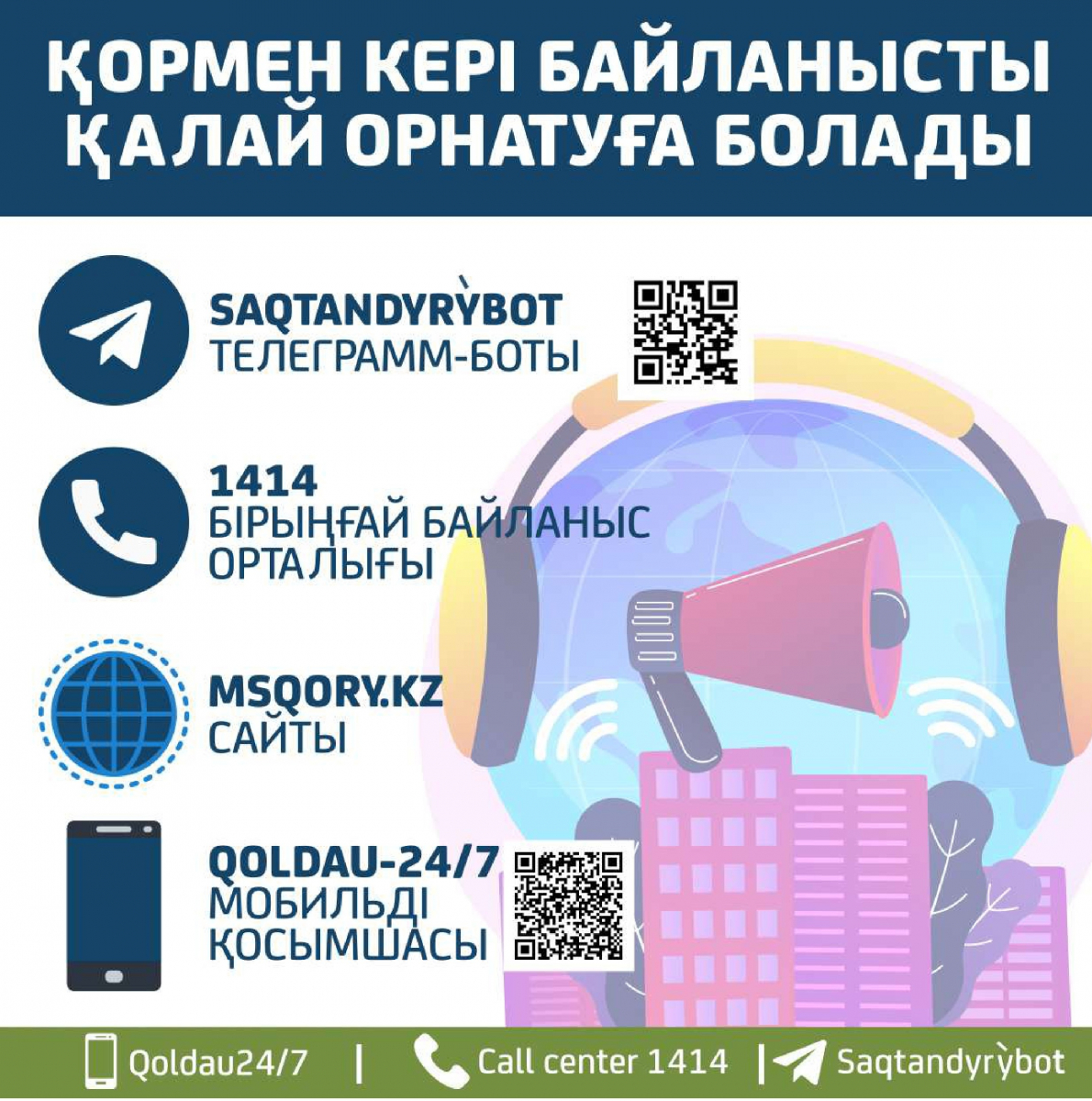
Protection of patient rights
If you have any questions about receiving medical care, checking or verifying your status as an insured person, or about the medical services provided under the guaranteed free medical care and compulsory social health insurance schemes, you can ask them through the available communication channels.
- Contact the Patient Support and Internal Audit Service for help. Such a service works in every medical organization. More detailed information can be found at the reception of an outpatient clinic or hospital.
- Contact the Call Center of the Regional Health Department. Since all the medical organizations are subordinate to health departments, their representatives will be able to help you settle your issue.
- Submit a request in the Qoldau 24/7 mobile app. Upon receipt of your request, the specialists of the Social Health Insurance Fund will get in touch with the medical organization and check the quality of the service provided. If you have not received it for one reason or another, they will try to find out the reason for the refusal. All the requests are registered and given a reference number which allows you to track the status of a request.
- Submit a request to @SaqtandyryBot on Telegram. To do this, select the "Send a request to the Fund" command from the main menu. A request should include the nature of the problem and the name of the region and medical organization.
- Contact the Integrated Call Center (1414). Calls from mobile and landline phones are free-of-charge throughout Kazakhstan.
- Submit a request on the official website of the Social Health Insurance Fund (https://msqory.kz/ru/). To do this, hover the cursor over the "Submit a request" button at the bottom of the page and fill-in all the fields.




